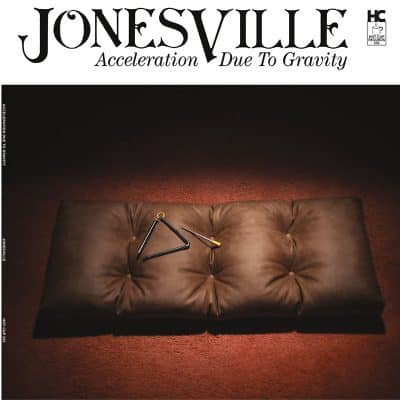Moppa Elliott – Advancing on a Wild Pitch – Disasters Vol. 2 – Acceleration Due to Gravity – Jonesville
Moppa Elliott
Advancing on a Wild Pitch (Quintet) – Disasters Vol. 2
Acceleration Due to Gravity (Nonet) – Jonesville
Hot Cup
The creative compositional mind of bassist Moppa Elliott is so full of brimming ideas that he’s released two recordings with two different bands on the same day. In fact, other than the leader, his quintet, Advancing on a Wild Pitch: and nonet, Acceleration Due to Gravity, don’t share any other musicians. The themes are completely different as well. The quintet album, their second release, has each composition named after a town in Pennsylvania that experienced major disasters of the train collision, police bombing, toxic smog or other industrial accident variety. We’ll take this one first.
 Advancing on a Wild Pitch (Quintet) – Disasters Vol. 2 – The quintet plays mostly in a classic jazz style albeit which is rare considering the backgrounds of the musicians that lean toward free jazz and chamber music, and even R&B. Elliott is mostly in a supportive role, leaving the soloing in this brief 36-minute session to his bandmates – baritone saxophonist Charles Evans, trombonist Sam Kulik, pianist Danny Fox, and drummer Christian Coleman. So, rather than the standard trumpet, tenor or alto saxophone front line we have baritone sax and trombone instead. Low registers reign, rather appropriate for the disaster related material.
Advancing on a Wild Pitch (Quintet) – Disasters Vol. 2 – The quintet plays mostly in a classic jazz style albeit which is rare considering the backgrounds of the musicians that lean toward free jazz and chamber music, and even R&B. Elliott is mostly in a supportive role, leaving the soloing in this brief 36-minute session to his bandmates – baritone saxophonist Charles Evans, trombonist Sam Kulik, pianist Danny Fox, and drummer Christian Coleman. So, rather than the standard trumpet, tenor or alto saxophone front line we have baritone sax and trombone instead. Low registers reign, rather appropriate for the disaster related material.
Opener “Powelton Village” features primarily Kulik and Fox in a Mingus-like take that weaves through several tempo changes and sweeping orchestrations with hints of blues. “Cobb’s Creek” is a mournful waltz grounded in blues that also features the trombonist and pianist, the former making deft use of the plunger mute. There are a series of arpeggios that mark the sections, keeping the tune elusive throughout. “Marcus Hook” begins as a standard 12/8 blues with the theme stated definitively by Evans and Kulik in parallel octaves following Fox’s piano introduction. This rare sequence is the highlight, with Evans later emerging as the principal soloist twisting and turning the chorus inside and out and ending not with a predictable climax, but a floating, unresolved chord instead. Mingus and Pepper Adams would be proud.
“The Donora Smog” is a swinger, alternating with start-stop rhythms and featuring a witty turn from Evans, delving into microtones followed by Fox who begins with a deliberate, minimal approach before progressing to cascading intensity. “Mud Run” is a tour-de-force for the two horns, evoking Count Basie-like orchestration, and a true swinging vibe, ending with Fox, who also employs a Basie-like coda. “Van Meter” features Kulik in one of the deepest, chilling yet elegant bluesy solos heard in recent memory with a worthy, respectable response from pianist Fox. The quintet emerges from the lamenting into frenzied up tempo for the closer “Dimock” as the bass-drum tandem lays down a groove over which Evans and Kulik solo before a series of vigorous exchanges with drummer Coleman. Fox then goes barrelhouse-like in his solo, before the band regroups and brings it to a rousing finale without reprising the original theme. This is first-rate jazz rendered by a front-line configuration rarely heard with deep blues to boot.
 Acceleration Due to Gravity (Nonet) – Jonesville – The link between this and Disasters Vol. 2 is that Elliott’s four originals, true to his ongoing mantra, are named for towns in Pennsylvania, yet the theme of the album is to commemorate the centennial year of legendary bassist and composer Sam Jones, who was a vital fixture in the soul-jazz/hard bop bands of Cannonball Adderley. Hence three of these compositions are from Jones, interspersed in the sequencing with Elliott’s originals, which are inspired and composed in a Jones-like manner. The album is like an EP, clocking in at a mere 27 minutes. Along with Elliott, the nonet (ADTG) features an elite group of forward-thinking musicians, many of whom are bandleaders and have orchestral and creative scene backgrounds, some of whom should be familiar to readers of these pages. They are trumpeter Bobby Spellman, trombonist Dave Taylor, alto saxophonist Matt Nelson, tenor saxophonist Stacy Dillard, baritone saxophonist Kyle Saulnier, guitarist Ava Mendoza, pianist George Burton, and drummer Mike Pride.
Acceleration Due to Gravity (Nonet) – Jonesville – The link between this and Disasters Vol. 2 is that Elliott’s four originals, true to his ongoing mantra, are named for towns in Pennsylvania, yet the theme of the album is to commemorate the centennial year of legendary bassist and composer Sam Jones, who was a vital fixture in the soul-jazz/hard bop bands of Cannonball Adderley. Hence three of these compositions are from Jones, interspersed in the sequencing with Elliott’s originals, which are inspired and composed in a Jones-like manner. The album is like an EP, clocking in at a mere 27 minutes. Along with Elliott, the nonet (ADTG) features an elite group of forward-thinking musicians, many of whom are bandleaders and have orchestral and creative scene backgrounds, some of whom should be familiar to readers of these pages. They are trumpeter Bobby Spellman, trombonist Dave Taylor, alto saxophonist Matt Nelson, tenor saxophonist Stacy Dillard, baritone saxophonist Kyle Saulnier, guitarist Ava Mendoza, pianist George Burton, and drummer Mike Pride.
Elliott, in typically unconventional fashion, uses a rather novel approach, basing his originals on loops that undergo transformation with each repetition, staggered against each other. Each composition, none longer than three-and-a-half minutes, uses musical phrases that in other vernaculars would be termed samples, that loop and repeat but never in the same way. Hence, there is no central hook, but room for three soloists (the Jones tunes have room from more), each improvising. Elliott adapted this model from music of The Wu-Tang Clan, The Roots, Run the Jewels, DJ Premiere and other hip-hop artists.
Let’s take the Jones’ tunes first. “Choice” opens with Dillard and Nelson trading fiery lines, heavy on vibrato. Saulnier gets his own space before Mendoza joins him, as the brass of Taylor on bass trombone and Spellman’s trumpet have the final say. Burton kicks off “Miami Drag,” one that traces to Jones’ days on jump blues on the Chitlin’ Circuit. Taylor enters again with a muted bass trombone before Mendoza smears the whole vibe with her distorted guitar, leaving some room for Dillard before joining him on the close. “Stack of Dollars” is one of Jones’ enduring standards, but this nonet treats it in such an irreverent manner, making the term “standard” seemingly completely out of context with its shifting rhythms and playful turns from Nelson, Spellman, and Mendoza.
Elliott takes to the electric bass on his “Delaware Water Gap” with Taylor moving to tenor trombone with a plunger mute. Nelson on alto is especially aggressive in his staccato, shrieking, and squawking turn, answered by Dillard who adapts a honking ‘50s like tenor style replete with trills and vibrato. This, like several of Elliott’s tunes, ends so abruptly that you may think you just experienced a power outage.
“Unity” opens with Dillard blowing a flurry of clusters before Mendoza and Spellman spare in the second solo sequence, leaving it to Burton to close with his trademark block chords and flamboyant percussive style. Spellman leads into “Cedar Run,” which begins in a conventional swing feel before morphing through stop-time sections and off-the-cuff excursions, none more so than Saulnier who blasts in with his baritone, modified with electronic effects to supply an additional power surge that ultimately climaxes in a blackout-like abrupt ending. The closer, “Jonesville” is the most “out there” of the bunch with Mendoza and Nelson launching weirdly invasive solos over a stomping beat before Saulnier and Taylor attack the low end in a feisty duel that eventually leads to the entire nonet concluding the piece with a definitive, emphatic chord as if to say, “take that.”
Clearly, there are few to any boundaries for Elliott’s compositional concepts. The quintet album is easily the more accessible of the two, but the nonet album takes the music of Sam Jones into unimaginable territory. Both should be required listens for those seeking a rather accessible brand of progressive, avant-garde music.
- Jim Hynes
Buy Us a Cup of Coffee!
Join the movement in supporting Making a Scene, the premier independent resource for both emerging musicians and the dedicated fans who champion them.
We showcase this vibrant community that celebrates the raw talent and creative spirit driving the music industry forward. From insightful articles and in-depth interviews to exclusive content and insider tips, Making a Scene empowers artists to thrive and fans to discover their next favorite sound.
Together, let’s amplify the voices of independent musicians and forge unforgettable connections through the power of music
Make a one-time donation
Make a monthly donation
Make a yearly donation
Buy us a cup of Coffee!
Or enter a custom amount
Your contribution is appreciated.
Your contribution is appreciated.
Your contribution is appreciated.
DonateDonate monthlyDonate yearlyYou can donate directly through Paypal!
Subscribe to Our Newsletter
Discover more from Making A Scene!
Subscribe to get the latest posts sent to your email.














































